Toward a Comprehensive Evaluation of Student Knowledge Assessment for Art Education: A Hybrid Approach by Data Mining and Machine Learning
Abstract
1. Introduction
- -
- Through the importance analysis of the input characteristic values, the most serious characteristic values affecting the assessment of students’ learning levels are discovered. This provides theoretical support for the use of the system to evaluate learning abilities in the future, and helps in the development of programs guiding students’ learning;
- -
- Traditional evaluation models have limitations, so this study uses artificial intelligence as a forecasting tool to build machine learning models. Compared with the traditional model, it can detect the internal relationships between different variables more effectively, and effectively improve the generalization ability of the prediction model, so that the model is not limited to the unilateral assessment of students’ learning ability;
- -
- It precludes the hyperparameter selection problem that arises in the machine learning model and the impact of extreme data on model prediction performance. In this study, three algorithms, SSA, ISSA, and KPCA-ISSA, are introduced to combine with the machine learning model. Thus, the reliability of the prediction results of the machine learning model is improved.
2. Materials
3. Methodology
3.1. Data Pre-Processing
3.2. Data Classification and Evaluation Methods
3.3. Tuning Algorithms and Machine Learning Models
3.3.1. Support Vector Machine (SVM)
3.3.2. Sparrow Search Algorithm (SSA) and Improved Sparrow Search Algorithm (ISSA)
3.3.3. Kernel Principal Component Analysis (KPCA)
3.4. Evaluation Index
4. Results and Discussion
4.1. Hyperparameter Adjustment for the Student’s Knowledge Level Prediction
4.2. Hyperparameter Adjustment for the Student’s Knowledge Level Prediction
4.3. Hyperparameter Adjustment for the Student’s Knowledge Level Prediction
4.4. Importance Analysis of Factors Related to Students’ Knowledge Level
4.5. Discussion
5. Conclusions
- Experiments show that the SSA, ISSA, and KPCA-ISSA compound algorithms can effectively improve the adaptability of the SVM model to data after multiple iteration optimization. According to the data, the ISSA algorithm has the lowest adaptation value of 0.0245 after four iterations;
- The prediction accuracies of the four models can be found. The results of the SVM model training stage produced an overfitting phenomenon, and the accuracy values of the training stage and test stage were 96.0584 and 91.8033, respectively. However, as the complexity of the composite model increased, the problem of overfitting was solved. The accuracy values of the KPCA-ISSA-SVM model in the training stage and test stage were 96.7972 and 96.7213, respectively. Therefore, improving the complexity of the model can effectively reduce the phenomenon of underfitting or overfitting;
- The importance experiment was used to explore the key variables that had the greatest influence on the prediction of students’ learning levels. Regarding the data, the importance scores of PEG and LPR were 9.5958 and 4.2821, respectively; far greater than the other three input variables (STR, STG, and SCG). This means that the model will be biased towards PEG and LPR changes when predicting and evaluating students’ learning levels, thus affecting the predicted results. Therefore, more attention should be paid to the PEG and LPR parameters of students when using UNS to evaluate students and specify study plans.
Author Contributions
Funding
Institutional Review Board Statement
Informed Consent Statement
Data Availability Statement
Conflicts of Interest
References
- Yin, H.B.; Han, J.; Liu, J.; Dong, J. The Application Design of Machine Learning in Intelligent Learning Support System. Adv. Mater. Res. 2012, 403–408, 1535–1538. [Google Scholar] [CrossRef]
- Leem, B.-H.; Hyunju, K.; Won, E.S.; Kumar, S. Using Sentiment Analysis to Analyze the Feedback of Students with Open-ended Questions. Stud. Humanit. Soc. Sci. 2020, 63, 55–64. [Google Scholar] [CrossRef]
- Karakas, E.; Yondem, M.T. Performance-based evaluation of computational thinking skills using machine learning. In Proceedings of the 2020 Turkish National Software Engineering Symposium (UYMS), İstanbul, Turkey, 7–9 October 2020; pp. 130–134. [Google Scholar]
- Feng, H.; Ouyang, W. Based on the Game Theory Analysis of Student Teaching Evaluation in Chinese Universities. In Proceedings of the 2015 4th International Conference on Social Sciences and Society (ICSSS 2015), Bucharest, Romania, 27 February 2015; pp. 46–50. [Google Scholar]
- Marks, G.N. Are between- and within-school differences in student performance largely due to socio-economic background? Evidence from 30 countries. Educ. Res. 2006, 48, 21–40. [Google Scholar] [CrossRef]
- Choudhury, I. Correlates of student performance in environmental control systems courses at an undergraduate level. In Proceedings of the Proceedings of the 35 th Annual Conference of the Associated Schools of Construction, San Luis Obispo, CA, USA, 7–10 April 1999; pp. 21–28. [Google Scholar]
- Kannan, N.; Yeh, C.Y.C.; Chou, C.-Y.; Chan, T.-W. A Machine Learning Approach to Estimating Student Mastery by Predicting Feedback Request and Solving Time in Online Learning System. In Proceedings of the 29th International Conference on Computers in Education (ICCE 2021), Online, 22–26 November 2021; pp. 241–250. [Google Scholar]
- Ibarra-Vazquez, G.; Ramirez-Montoya, M.S.; Buenestado-Fernandez, M.; Olague, G. Predicting open education competency level: A machine learning approach. Heliyon 2023, 9, e20597. [Google Scholar] [CrossRef] [PubMed]
- Almufarreh, A.; Noaman, K.M.; Saeed, M.N. Academic Teaching Quality Framework and Performance Evaluation Using Machine Learning. Appl. Sci. 2023, 13, 3121. [Google Scholar] [CrossRef]
- Heffernan, T. Sexism, racism, prejudice, and bias: A literature review and synthesis of research surrounding student evaluations of courses and teaching. Assess. Eval. High. Educ. 2022, 47, 144–154. [Google Scholar] [CrossRef]
- Uttl, B.; White, C.A.; Gonzalez, D.W. Meta-analysis of faculty’s teaching effectiveness: Student evaluation of teaching ratings and student learning are not related. Stud. Educ. Eval. 2017, 54, 22–42. [Google Scholar] [CrossRef]
- Zine, M.; Harrou, F.; Terbeche, M.; Bellahcene, M.; Dairi, A.; Sun, Y. E-Learning Readiness Assessment Using Machine Learning Methods. Sustainability 2023, 15, 8924. [Google Scholar] [CrossRef]
- Mahmud, Z.; Ghani, N.A.M.; Rahim, R.A. Assessing Students’ Learning Ability in A Postgraduate Statistical Course: A Rasch Analysis. Procedia-Soc. Behav. Sci. 2013, 89, 890–894. [Google Scholar] [CrossRef]
- Bakar, M.A.A.; Ghani, A.T.A.; Abdullah, M.L.; Ismail, N.; Aziz, S.A. Adaptive Neuro-Fuzzy Inference System (ANFIS) Formulation to Predict Students’ Neuroscience Mechanistic: A Concept of an Intelligent Model to Enhance Mathematics Learning Ability. TEM J.-Technol. Educ. Manag. Inform. 2022, 11, 1942–1951. [Google Scholar] [CrossRef]
- Huang, J.; Zhou, M.; Zhang, J.; Ren, J.; Vatin, N.I.; Sabri, M.M.S. The use of GA and PSO in evaluating the shear strength of steel fiber reinforced concrete beams. KSCE J. Civ. Eng. 2022, 26, 3918–3931. [Google Scholar] [CrossRef]
- Huang, J.D.; Xue, J.H. Optimization of SVR functions for flyrock evaluation in mine blasting operations. Environ. Earth Sci. 2022, 81, 434. [Google Scholar] [CrossRef]
- Daouas, T.; Rojas Medina, B.; Garcia Meseguer, M.J. Predicting the Student Skills’ Level Based on an Online Collaborative Learning. In Proceedings of the 12th International Conference of Education, Research and Innovation (ICERI 2019), Seville, Spain, 11–13 November 2019; pp. 774–783. [Google Scholar]
- Zhong, L.; Qi, C.; Gao, Y. Deep Learning-Assisted Performance Evaluation System for Teaching SCM in the Higher Education System: Performance Evaluation of Teaching Management. Inf. Resour. Manag. J. 2022, 35, 1–22. [Google Scholar] [CrossRef]
- Wan, H.; Yu, Q.; Ding, J.; Liu, K. Students’ Behavior Analysis under the Sakai LMS. In Proceedings of the 2017 IEEE 6th International Conference on Teaching, Assessment, and Learning for Engineering (TALE), Hong Kong, China, 12–14 December 2017; pp. 250–255. [Google Scholar]
- Alruwais, N.; Zakariah, M. Evaluating Student Knowledge Assessment Using Machine Learning Techniques. Sustainability 2023, 15, 6229. [Google Scholar] [CrossRef]
- Huang, J.; Zhang, J.; Li, X.; Qiao, Y.; Zhang, R.; Kumar, G.S. Investigating the effects of ensemble and weight optimization approaches on neural networks’ performance to estimate the dynamic modulus of asphalt concrete. Road Mater. Pavement Des. 2023, 24, 1939–1959. [Google Scholar] [CrossRef]
- Huang, J.; Zhou, M.; Zhang, J.; Ren, J.; Vatin, N.I.; Sabri, M.M.S. Development of a new stacking model to evaluate the strength parameters of concrete samples in laboratory. Iran. J. Sci. Technol. Trans. Civ. Eng. 2022, 46, 4355–4370. [Google Scholar] [CrossRef]
- Tai, F.; Cui, Y.; Liu, W.; Li, Z.; Assoc Comp, M. Study on Data Analysis of Assessment in Class Based on Students’ Evaluation of Teaching. In Proceedings of the 2019 International Conference on Big Data and Education (ICBDE 2019), Los Angeles, CA, USA, 9–12 December 2019; pp. 103–107. [Google Scholar]
- Wang, R.R.; Zhang, J.; Lu, Y.J.; Huang, J.D. Towards Designing Durable Sculptural Elements: Ensemble Learning in Predicting Compressive Strength of Fiber-Reinforced Nano-Silica Modified Concrete. Buildings 2024, 14, 396. [Google Scholar] [CrossRef]
- Shao, D.; Ma, X.; Song, H.; Li, C.; Sun, X. On the Implementation Strategy of Students’ Evaluation on Teachers’ Teaching Quality. In Proceedings of the 2018 2nd International Conference on Education, Economics and Management Research (ICEEMR 2018), Singapore, 9–10 June 2018; pp. 723–726. [Google Scholar]
- Sandiwarno, S.; Niu, Z.; Nyamawe, A.S. A Novel Hybrid Machine Learning Model for Analyzing E-Learning Users’ Satisfaction. Int. J. Hum.-Comput. Interact. 2023, 1–22. [Google Scholar] [CrossRef]
- Tanveer, M.; Rajani, T.; Rastogi, R.; Shao, Y.H.; Ganaie, M.A. Comprehensive review on twin support vector machines. Ann. Oper. Res. 2022. [Google Scholar] [CrossRef]
- Yue, Y.; Cao, L.; Lu, D.; Hu, Z.; Xu, M.; Wang, S.; Li, B.; Ding, H. Review and empirical analysis of sparrow search algorithm. Artif. Intell. Rev. 2023, 56, 10867–10919. [Google Scholar] [CrossRef]
- Zhang, C.; Ding, S. A stochastic configuration network based on chaotic sparrow search algorithm. Knowl.-Based Syst. 2021, 220, 106924. [Google Scholar] [CrossRef]
- Liu, G.; Shu, C.; Liang, Z.; Peng, B.; Cheng, L. A Modified Sparrow Search Algorithm with Application in 3d Route Planning for UAV. Sensors 2021, 21, 1224. [Google Scholar] [CrossRef] [PubMed]
- Pani, A.K. Non-linear process monitoring using kernel principal component analysis: A review of the basic and modified techniques with industrial applications. Braz. J. Chem. Eng. 2022, 39, 327–344. [Google Scholar] [CrossRef]
- Müller, K.R.; Mika, S.; Rätsch, G.; Tsuda, K.; Schölkopf, B. An introduction to kernel-based learning algorithms. IEEE Trans. Neural Netw. 2001, 12, 181–201. [Google Scholar] [CrossRef]
- Motai, Y. Kernel Association for Classification and Prediction: A Survey. IEEE Trans. Neural Netw. Learn. Syst. 2015, 26, 208–223. [Google Scholar] [CrossRef] [PubMed]
- Zhang, J.; Wang, R.; Lu, Y.; Huang, J. Prediction of Compressive Strength of Geopolymer Concrete Landscape Design: Application of the Novel Hybrid RF–GWO–XGBoost Algorithm. Buildings 2024, 14, 591. [Google Scholar] [CrossRef]
- Wang, R.R.; Zhang, J.; Lu, Y.J.; Ren, S.S.; Huang, J.D. Towards a Reliable Design of Geopolymer Concrete for Green Landscapes: A Comparative Study of Tree-Based and Regression-Based Models. Buildings 2024, 14, 615. [Google Scholar] [CrossRef]
- Sun, Z.; Li, Y.L.; Yang, Y.X.; Su, L.; Xie, S.J. Splitting tensile strength of basalt fiber reinforced coral aggregate concrete: Optimized XGBoost models and experimental validation. Constr. Build. Mater. 2024, 416, 135133. [Google Scholar] [CrossRef]
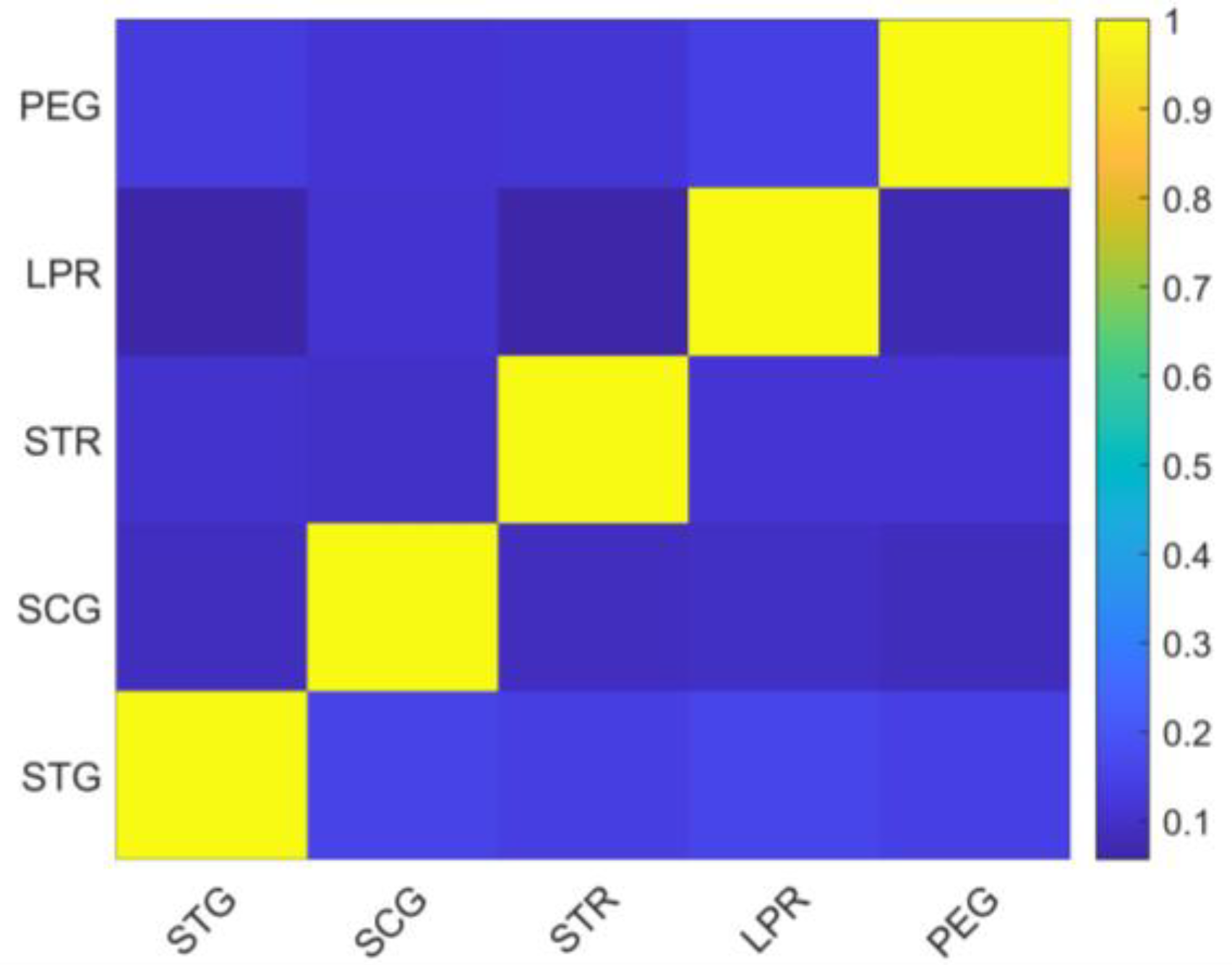
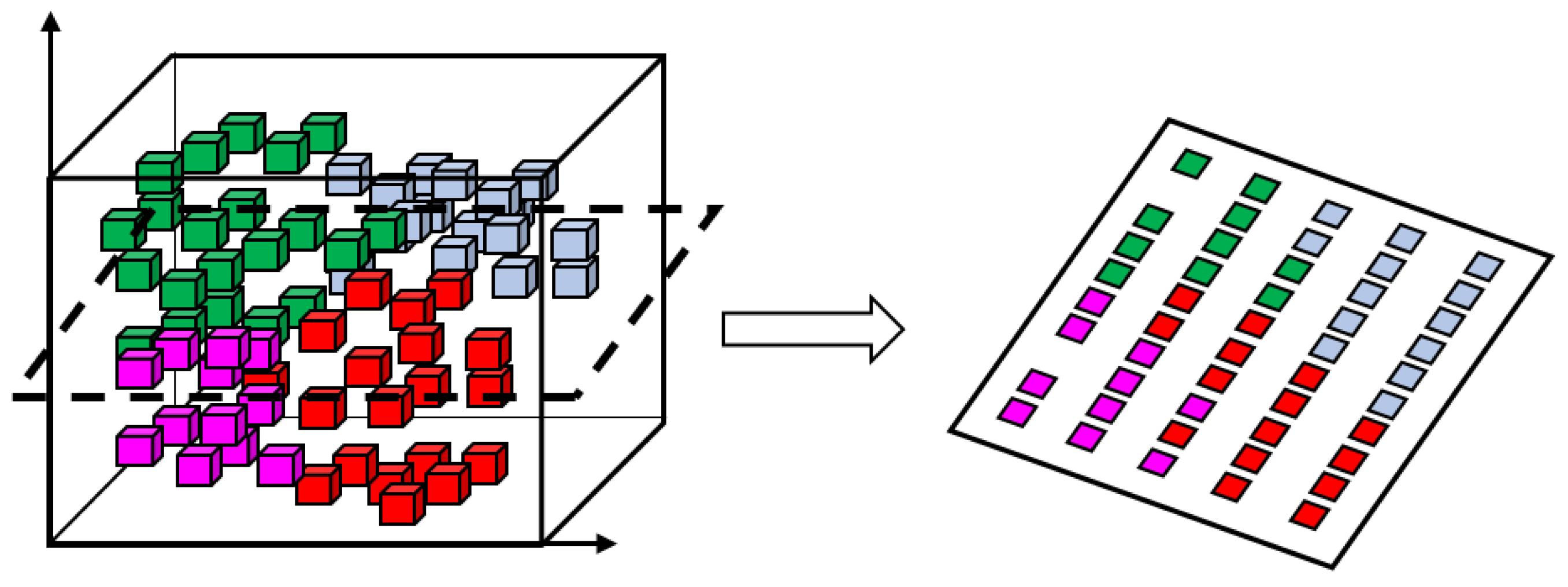

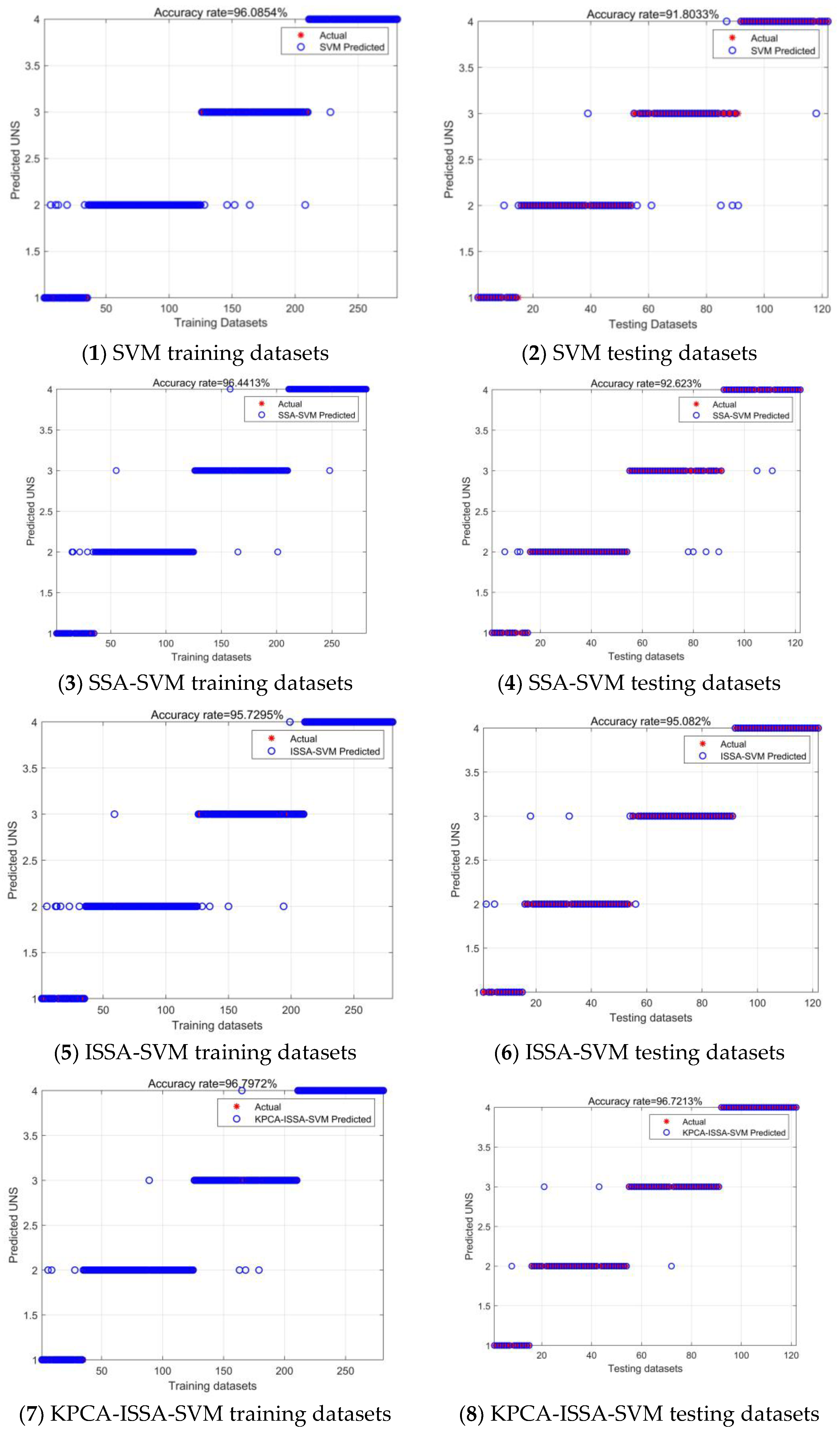
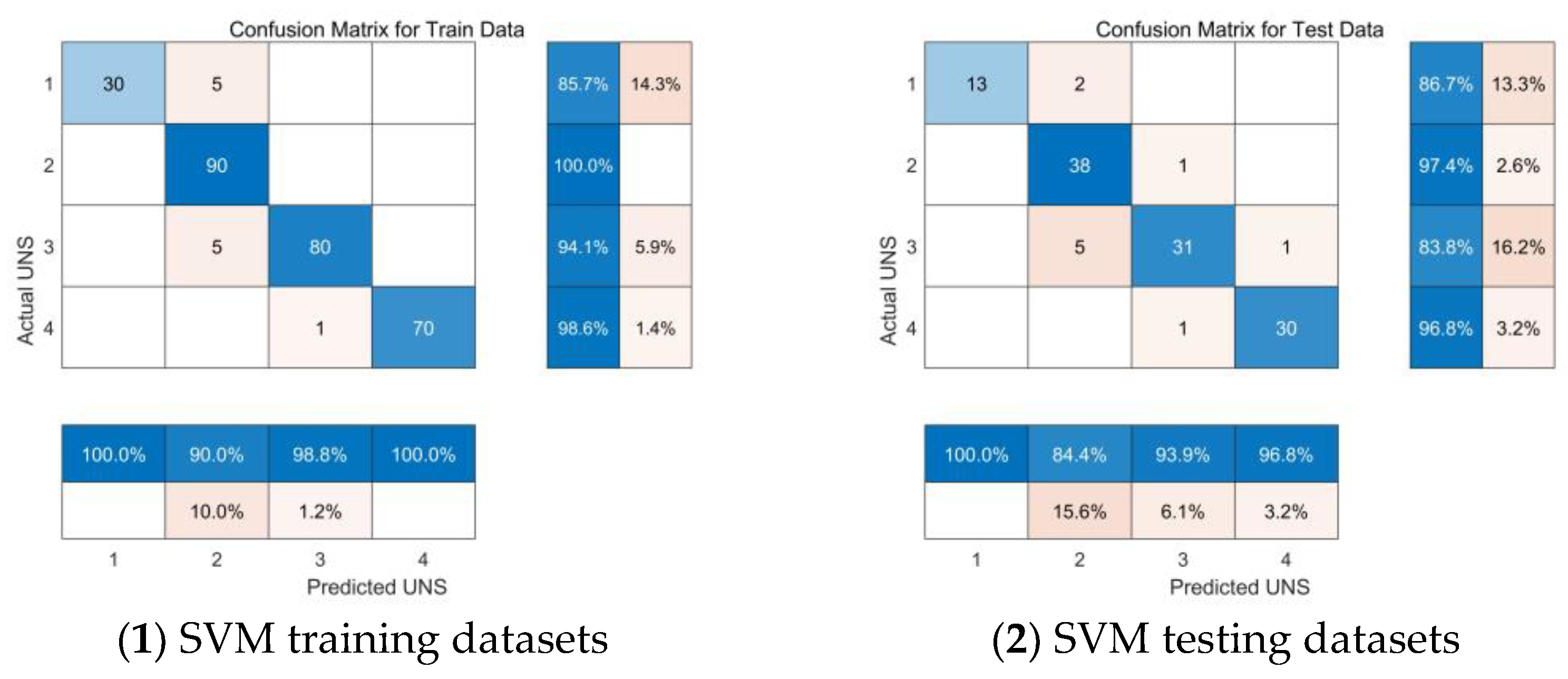

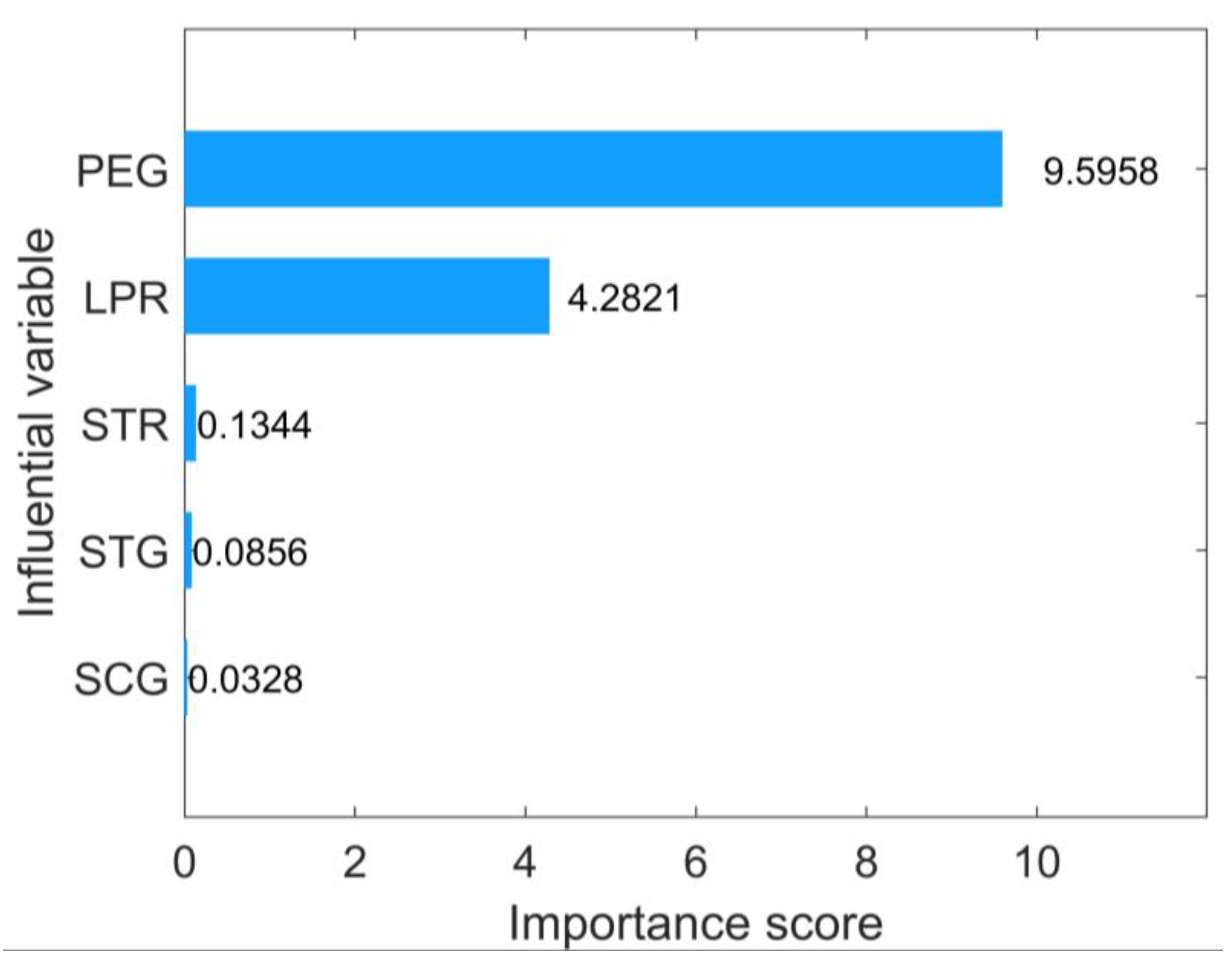
| Attribute Type | Evaluation Characteristics | Attribute Description |
|---|---|---|
| Individual behavioral | Length of study for target subjects | The amount of time students spend on learning objectives |
| Target subject study times | The number of times students repeat the learning objective | |
| Length of study in relevant subjects | The amount of time students spend learning information related to their learning objectives | |
| Exam score related | Target subject test scores | The students’ test scores in other subjects related to the learning objectives |
| Relevant subject test results | Student test scores in target subjects | |
| Knowledge level | User knowledge state | Student learning level assessment indicators |
| Predicted | |||
|---|---|---|---|
| Positive | Negative | ||
| Actual | Positive | True positive (TP) | False negative (FN) |
| Negative | False positive (FP) | True negative (TN) | |
| Accuracy Rate (%) | SVM | SSA-SVM | ISSA-SVM | KPCA-ISSA-SVM |
|---|---|---|---|---|
| Training Datasets | 96.0584 | 96.4413 | 95.7295 | 96.7972 |
| Testing Datasets | 91.8033 | 92.623 | 95.082 | 96.7213 |
Disclaimer/Publisher’s Note: The statements, opinions and data contained in all publications are solely those of the individual author(s) and contributor(s) and not of MDPI and/or the editor(s). MDPI and/or the editor(s) disclaim responsibility for any injury to people or property resulting from any ideas, methods, instructions or products referred to in the content. |
© 2024 by the authors. Licensee MDPI, Basel, Switzerland. This article is an open access article distributed under the terms and conditions of the Creative Commons Attribution (CC BY) license (https://creativecommons.org/licenses/by/4.0/).
Share and Cite
Wang, S.; Wang, H.; Lu, Y.; Huang, J. Toward a Comprehensive Evaluation of Student Knowledge Assessment for Art Education: A Hybrid Approach by Data Mining and Machine Learning. Appl. Sci. 2024, 14, 5020. https://doi.org/10.3390/app14125020
Wang S, Wang H, Lu Y, Huang J. Toward a Comprehensive Evaluation of Student Knowledge Assessment for Art Education: A Hybrid Approach by Data Mining and Machine Learning. Applied Sciences. 2024; 14(12):5020. https://doi.org/10.3390/app14125020
Chicago/Turabian StyleWang, Shan, Hongtao Wang, Yijun Lu, and Jiandong Huang. 2024. "Toward a Comprehensive Evaluation of Student Knowledge Assessment for Art Education: A Hybrid Approach by Data Mining and Machine Learning" Applied Sciences 14, no. 12: 5020. https://doi.org/10.3390/app14125020
APA StyleWang, S., Wang, H., Lu, Y., & Huang, J. (2024). Toward a Comprehensive Evaluation of Student Knowledge Assessment for Art Education: A Hybrid Approach by Data Mining and Machine Learning. Applied Sciences, 14(12), 5020. https://doi.org/10.3390/app14125020






